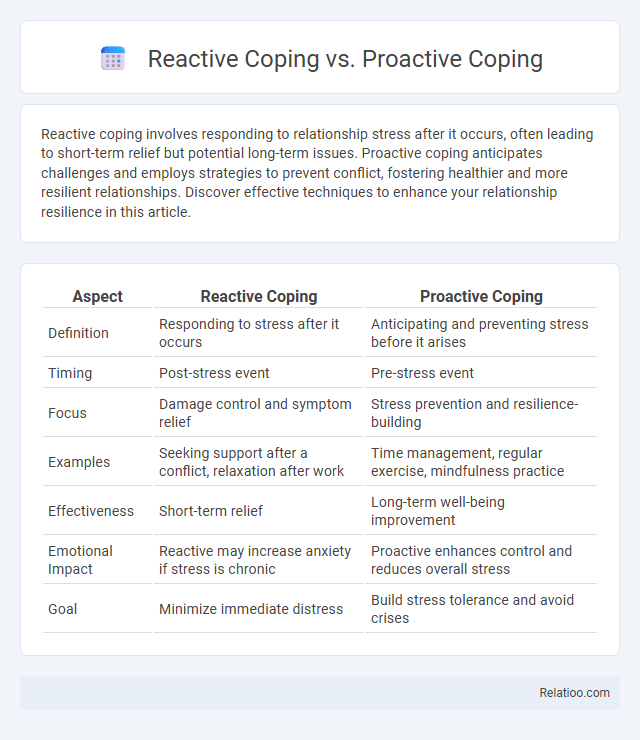Reactive coping involves responding to relationship stress after it occurs, often leading to short-term relief but potential long-term issues. Proactive coping anticipates challenges and employs strategies to prevent conflict, fostering healthier and more resilient relationships. Discover effective techniques to enhance your relationship resilience in this article.
Table of Comparison
| Aspect | Reactive Coping | Proactive Coping |
|---|---|---|
| Definition | Responding to stress after it occurs | Anticipating and preventing stress before it arises |
| Timing | Post-stress event | Pre-stress event |
| Focus | Damage control and symptom relief | Stress prevention and resilience-building |
| Examples | Seeking support after a conflict, relaxation after work | Time management, regular exercise, mindfulness practice |
| Effectiveness | Short-term relief | Long-term well-being improvement |
| Emotional Impact | Reactive may increase anxiety if stress is chronic | Proactive enhances control and reduces overall stress |
| Goal | Minimize immediate distress | Build stress tolerance and avoid crises |
Introduction to Coping Strategies
Reactive coping involves responding to stressors after they occur, focusing on managing emotions and immediate problems, while proactive coping anticipates potential stressors to prevent or mitigate their impact through planning and resource accumulation. Reactivity refers to the physiological and psychological response intensity when facing stress, influencing how coping strategies are deployed. Effective stress management requires understanding the distinctions between reactive coping, proactive coping, and reactivity to tailor interventions for resilience and mental health improvement.
Defining Reactive Coping
Reactive coping refers to the strategies individuals use to manage stress or adverse situations after they occur, emphasizing immediate response rather than prevention. Unlike proactive coping, which involves anticipating and planning to mitigate potential stressors, reactive coping addresses problems as they arise, often driven by emotional reactivity. Understanding reactive coping helps you recognize patterns in stress management and develop more effective, forward-thinking resilience techniques.
Defining Proactive Coping
Proactive coping involves anticipating potential stressors and taking deliberate actions to prevent or mitigate their impact before they occur, distinguishing it from reactive coping, which deals with stressors after they arise. Reactive coping often focuses on managing immediate challenges, whereas proactivity emphasizes planning and resource accumulation to handle future difficulties effectively. Understanding proactive coping empowers you to build resilience by preparing and adapting in advance, reducing the intensity of stress responses and enhancing long-term well-being.
Key Differences Between Reactive and Proactive Coping
Reactive coping involves responding to stressors after they occur, focusing on managing negative emotions and consequences, whereas proactive coping entails anticipating potential stressors and taking preventive measures to build resilience. Key differences include timing, where reactive coping is post-event and often emotion-focused, while proactive coping is preemptive and goal-oriented, aiming to minimize future stress impact. Reactivity, in contrast, reflects immediate emotional responses without structured coping strategies, differentiating it from both reactive and proactive coping mechanisms.
Psychological Mechanisms Behind Each Approach
Reactive coping involves immediate, automatic responses to stressors, driven primarily by the amygdala's rapid threat detection and activation of the sympathetic nervous system. Proactive coping relies on anticipatory cognitive processes, engaging the prefrontal cortex to plan and implement strategies that mitigate potential future stress. Reactivity refers to the intensity and speed of emotional and physiological responses to stimuli, often mediated by individual differences in the hypothalamic-pituitary-adrenal (HPA) axis and emotional regulation circuits.
Benefits of Reactive Coping
Reactive coping involves responding to stressors after they occur, allowing you to manage immediate emotional or physical challenges effectively. This method provides benefits such as quick adaptation to unexpected situations, preventing escalation of stress, and promoting resilience by learning from experiences. Your ability to react promptly can enhance problem-solving skills and facilitate recovery in the face of sudden difficulties.
Advantages of Proactive Coping
Proactive coping enhances resilience by allowing individuals to anticipate stressors and implement strategies before challenges arise, reducing overall psychological strain. Unlike reactive coping, which addresses stress only after it occurs, proactive coping promotes long-term well-being through goal-directed efforts and resource accumulation. This forward-thinking approach increases adaptability and improves performance in both personal and professional settings.
Potential Drawbacks of Each Coping Strategy
Reactive coping often leads to increased stress due to delayed response, causing missed opportunities for prevention and exacerbation of problems. Proactive coping requires significant foresight and resources, which can lead to potential overplanning and anxiety about future uncertainties. Reactivity, characterized by immediate emotional responses, may result in impulsive decisions and reduced problem-solving effectiveness, undermining long-term mental health and resilience.
Choosing the Right Coping Strategy for Various Situations
Reactive coping involves responding to stressors after they occur, focusing on managing emotions and reducing immediate distress. Proactive coping anticipates potential stressors, building resources and strategies in advance to prevent or mitigate future challenges. Choosing the right coping strategy depends on the context: proactive coping suits long-term planning and control, while reactive coping is effective for unexpected or acute stress, and minimizing reactivity can improve emotional regulation across diverse situations.
Building Effective Coping Skills for Long-Term Resilience
Reactive coping involves responding to stress after it occurs, often leading to short-term relief but limited long-term effectiveness, whereas proactive coping anticipates potential stressors and implements strategies to prevent or mitigate their impact, fostering sustained resilience. Reactivity focuses on immediate emotional and behavioral responses without deliberate regulation, which can undermine long-term adaptive coping. Developing effective coping skills requires shifting from reactive patterns to proactive strategies that enhance emotional regulation, problem-solving, and stress management for enduring resilience.

Infographic: Reactive Coping vs Proactive Coping
 relatioo.com
relatioo.com